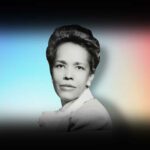Ella Josephine Baker was born on December 13, 1903. She was a civil rights and women’s rights advocate of African descent. She is renowned for her criticisms of sexism in the civil rights struggle and racism in American culture. She advocated for radical democracy, grassroots organizing, and the capacity of the downtrodden to comprehend their circumstances and speak up for themselves while criticizing professionalized charismatic leadership. She was a remarkable female figure in the civil rights movement and one of the most significant American leaders of the 20th century. Let us celebrate her.
Fast Facts
Full Name:
Ella Josephine Baker
Nickname:
Fundi
Birth date:
December 13, 1903
Death date:
December 13, 1986 (age 83)
Zodiac Sign:
Sagittarius
Background
Ella Josephine Baker was raised in Norfolk, Virginia, by her parents Georgiana (called Anna) and Blake Baker. In a race riot in Norfolk in 1910, whites attacked black shipyard workers. While their father continued to work for the shipping firm, her mother decided to move the family back to North Carolina. Baker had little impact as a child. Her father’s parents lived a day’s ride away, and her grandfather, Mitchell, had passed away. She frequently listened to stories told by her grandmother, Josephine Elizabeth ‘Bet’ Ross, about leaving the South to escape its oppressive culture. Ella received valedictorian honors after graduating from Shaw University in Raleigh, North Carolina. Years later, she returned to Shaw University to assist in the founding of S.N.C.C.
Then, in the quest for work, she relocated to New York. There she encountered individuals dealing with the Great Depression’s effects of poverty and misery and was introduced to the radical political action that would later become her life’s work. She joined the Young Negroes Cooperative League (Y.N.C.L.) in the late 1920s after relocating to New York, which allowed its members to combine their money to receive better prices on goods and services. She quickly rose to the position of national director. Baker started working as a field secretary for the National Association for the Advancement of Colored People (N.A.A.C.P.) in around 1940. In the role, she traveled a lot while raising money and enlisting new members for the group. She was appointed the N.A.A.C.P.’s national director of branches in 1943 but left the position three years later to care for her niece Jackie Brockington. Despite this, she continued to work with the New York branch to integrate neighborhood schools and raise the bar for black students’ education. She continued to live in New York and worked for a variety of regional businesses, including the New York Urban League. In 1952, she was appointed director of the N.A.A.C.P. chapter in New York.
Under Martin Luther King J.r.’s leadership, Baker assisted in the founding of the Southern Christian Leadership Conference (S.C.L.C.) in 1957. She oversaw the S.C.L.C.’s office in Atlanta, Georgia, and served as acting executive director; nevertheless, she also had disagreements with King and other male S.C.L.C. officials, who weren’t used to facing resistance from such a strong-willed woman, before leaving the group in 1960. She helped plan the event that gave rise to the Student Non-Violent Coordinating Committee (S.N.C.C.) in 1960 while she was working for the S.C.L.C. She gave this group of student activists her assistance and advice. Even in her older years, she fought for social justice and equality, advising groups like the Puerto Rican Solidarity Committee and the Third World Women’s Coordinating Committee. In the late 1930s, Baker wed T.J. Roberts; they divorced in 1958. On December 13, 1986 — her 83rd birthday — Baker passed away in New York City.
Career timeline
Baker is employed at the “Negro National News” as an editorial assistant.
As soon as she joins the Y.N.C.L., she is named national director.
In New York City, she begins a long relationship with N.A.A.C.P. and later works as their secretary.
She is appointed director of branches, making her the highest-ranking woman in the N.A.A.C.P.
To coordinate reform initiatives across the South, she meets with a group of black Southern ministers and helps organize the S.C.L.C.).
She works with the S.C.E.F., an organization established in the South that promotes racial desegregation and human rights, to assist black and white people in collaborating for social justice.
Why We Love Ella Baker
She lived for others
She worked her whole life to fight against racial segregation and injustice. She was there for people and helped with the advancement of black people.
She advocated for equality
For the sake of equality, she did not talk about her private life so that she could be accepted as an individual. She, like everyone else, just went about her life with her sole focus being the fight for equal rights.
She was a role model
She was fearless and a great role model for young girls and the black community. She was there for her people and inspired many others to join the fight against injustice.
5 Surprising Facts
There is a documentary about her life
Joanne Grant’s 1981 film “Fundi: The Story of Ella Baker” examines Baker’s significant contribution to the civil rights movement.
‘Ella’s Song’ is in her honor
Bernice Johnson Reagon composed ‘Ella’s Song’ for “Fundi” in memory of Baker.
Barbara Ransby wrote about her
“Ella Baker and the Black Freedom Movement: A Radical Democratic Vision,” written by historian and ardent activist Barbara Ransby, details her life and struggles.
She has a Candace Award
A Candace Award was given to her by the National Coalition of 100 Black Women.
No record of children
Her life was all about her work, and she had no children.
Ella Baker FAQs
Why is Ella Baker called the mother of the Civil Rights Movement?
Because of the leadership she showed, she is regarded as the mother of the Civil Rights Movement.
How did Ella Baker help Rosa Parks?
She encouraged people like Rosa Parks to stand up for themselves and speak out against injustice.
What did Ella Baker believe in?
She believed in egalitarian ideals.
Ella Baker’s birthday dates
| Year | Date | Day |
|---|---|---|
| 2024 | December 13 | Friday |
| 2025 | December 13 | Saturday |
| 2026 | December 13 | Sunday |
| 2027 | December 13 | Monday |
| 2028 | December 13 | Wednesday |

























